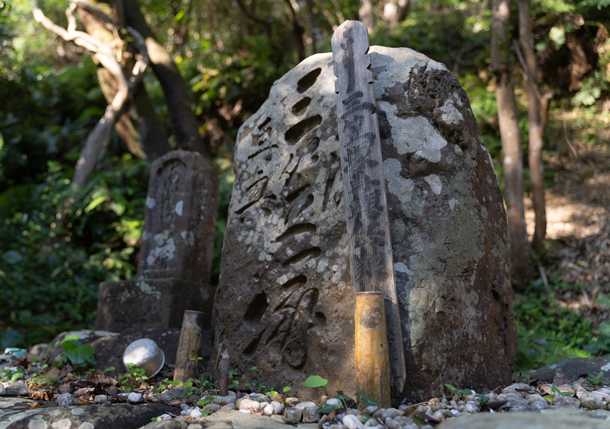- HOME
- Mikasa-zuka
A Legend Nurtured by Love
愛を育んだ伝承
A little way back from Shirataki stands an old, small stone monument called Mikasa-zuka.
It bears this poem:
“I turn my wish for Shirataki into love,
and without letting it dissolve into water’s spray,
I will continue to protect you.”

This poem was composed by a Zen monk who lived in hiding at Shirataki, mourning the recent loss of his beloved partner.
At the end of the Edo period, a young woman named Sato fell in love with a Zen monk from a temple on a remote island in Toba. Because their love was not accepted by those around them, they faced harsh criticism and opposition. The monk was forced to leave the temple and moved to Shirataki, a mountain known as Gyōja-yama, where ascetics practiced. Despite opposition from her community, Sato could not suppress her feelings. She too abandoned her village and followed the monk to Shirataki. For over fifty years, the two lived apart from the world, building a small hermitage here. They lived under the protection of Shirataki until Sato’s passing. The poem above was written by the monk after Sato died at the age of 72—remarkably long for a woman in those times, when average life expectancy was about 38. Though the inscription is now almost faded and hard to read, the poem can still be seen on Mikasa-zuka, Sato’s grave. Her funeral was quietly held by the monk, with records kept in the funeral ledger at Hakugonji Temple in Funatsu Town.
“I will continue to protect you.”
True to these words, the monk continued to watch over Sato and the place where she rests. The monk’s name remains unknown. However, local tradition tells of this man—who lived with Sato, died quietly at Shirataki, and was said to have been remarkably handsome.
